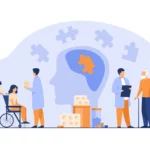
Early Onset Lewy Body Dementia: What you need to Know
This post may contain affiliate links or Google Ads and we may earn a small commission when you click on the links at no additional cost to you. As an Amazon Affiliate, we earn from qualifying purchases. This is at no additional cost to you and helps with our website expenses.
Early onset Lewy Body Dementia (LBD) is a form of dementia that can affect people at a much younger age than Alzheimer’s or other forms of dementia, with the average age being between 40-65 years old. This rare condition has symptoms that are similar to both Parkinson’s disease and Alzheimer’s disease, making it difficult to diagnose. It is important to understand the early warning signs so you can get help as soon as possible.

The most common symptom of early onset LBD is memory loss and confusion, but there are several other symptoms including difficulty sleeping, hallucinations, difficulty with movement and balance, disturbances in behavior and emotions, depression, and anxiety. Other physical symptoms such as tremors or stiff muscles may also be present. If you think you or someone you know may be experiencing any of these symptoms it is important to seek medical help right away for an accurate diagnosis.
The prognosis for early onset Lewy Body Dementia is often grim, as there are no effective treatments available to slow or stop the progression of the condition. However, medications and therapies can help greatly to manage.
Types of Doctors to see for Early Onset Lewy Body Dementia
Early Onset Lewy Body Dementia (EO-LBD) is a form of dementia that affects people under the age of 65. While it can be tough to diagnose, getting the right care from specialized doctors is key for those diagnosed with EO-LBD. To ensure the best care, patients should know what types of doctors to see and when to see them.
Primary care physicians are usually the first doctor that a patient will visit if they are exhibiting symptoms of EO-LBD. Primary care physicians can provide general medical advice, assess symptoms and refer patients on to specialist doctors if needed. Specialists may include neurologists who specialize in diseases related to the nervous system or geriatric psychiatrists who specialize in mental illnesses related to aging such as dementia or Alzheimer’s disease.
A neuropsychologist can also provide an assessment, treatment plan and cognitive rehabilitation for patients. Patients should seek care from a psychologist if they are currently experiencing depression or anxiety due to the disease or related symptoms.
Types of Treatment
Treatments for EO-LBD vary depending on the individual’s specific symptoms. Common treatments may include medications to treat movement disorders, anti-anxiety medications, cognitive therapy, and speech, physical, and occupational therapies.
Early detection of early onset Lewy Body Dementia is important for early treatment options. If you are concerned that you or someone you know may be at risk for this, consider talking to your doctor about the testing options available to you. With early diagnosis, treatments can be better managed and quality of life improved for those affected by early onset Lewy Body Dementia.
Does Early Onset Lewy Body Dementia Progress Faster than Later Onset?
There is currently no consensus on whether EO-LBD progresses faster than LO-LBD. Some studies have found that EO-LBD patients experience a more rapid decline in cognitive function, while other studies have found that there is no significant difference between the two groups. The reason for this discrepancy is not yet clear, but it is possible that different genetic or environmental factors play a role. More research is needed to determine the exact relationship between EO-LBD and LO-LBD.
The risk of EO-LBD may be higher in people with a family history of dementia or Parkinson’s disease. Other risk factors include age (it usually affects adults between the ages of 40 and 65) as well as head trauma and genetic mutations that might increase susceptibility to the condition.
Symptoms of Lewy Body Dementia
Early onset Lewy Body Dementia symptoms are similar, if not the same, as later onset. The symptoms are cognitive decline; difficulty with speech and writing, disturbances in behavior and emotions, movement disorders such as tremors or rigidity in muscles, sleep problems, depression, anxiety, and impaired ability to perform everyday tasks or activities of daily living. Additionally, early onset patients may be at higher risk for hallucinations and delusions. As the condition progresses these symptoms can worsen and additional symptoms may develop.
Early onset Lewy Body Dementia can be difficult to diagnose due to its overlapping symptomology with other conditions like Alzheimer’s Disease. It is important to get a proper diagnosis from your doctor so that you can receive early treatment options which can improve quality of life. Treatment varies depending on the individual’s specific symptoms but common treatments include medications to treat movement disorders.
With early onset Lewy Body Dementia patients are often still working. Symptoms might start to become obvious in their work, such as forgetting things or making more mistakes than usual. It is important for the patient and their employer to know what they are dealing with. Early onset LBD patients can sometimes continue to work (depending on the type of job) until they are in more advanced stages of their disease.
Conclusion
Early onset Lewy Body Dementia is a degenerative disease that can affect younger adults, usually between the ages of 40 and 65. It has no known cure and early diagnosis is important for early treatment options to be taken advantage of. Common treatments include medications to treat movement disorders, anti-anxiety medications, cognitive therapy, and speech and occupational therapies.
There is currently no consensus on whether it progresses faster than later onset, but more research is needed to determine the exact relationship between the two groups. Symptoms are similar in early and late-onset patients but early onset patients may be at higher risk for hallucinations and delusions. If you have concerns about early onset Lewy Body Dementia please consult your doctor for advice.
By understanding early onset Lewy Body Dementia, its symptoms, risk factors, and treatment options, you can be better prepared to manage the condition and improve the quality of life for those affected.
Sources:




